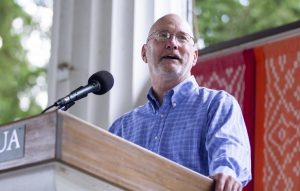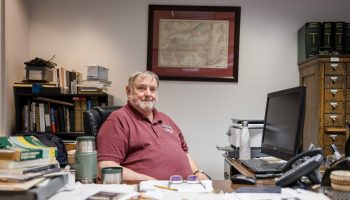
For Week Five’s Interfaith Friday in the Hall of Philosophy, the Rt. Rev. V. Gene Robinson, vice president of religion and senior pastor, posed a series of questions to Philip Gulley, who spoke on behalf of Quakerism.
Gulley is a writer, Quaker pastor and speaker. He received his Master of Divinity from Christian Theological Seminary, and has written over 22 books. His book, I Love You, Miss Huddleston: And Other Inappropriate Longings of My Indiana Childhood, was a finalist for the Thurber Prize for American Humor. His best-selling titles include the Harmony fiction series, the Porch Talk series of inspirational essays and If Grace is True, co-written by James Mulholland.
What follows is an abridged version of Gulley’s conversation. Gulley and Robinson’s remarks have been condensed for clarity.
Robinson: You describe a humankind that has agency. That’s a high and empowering view of humankind. Isn’t there some inevitability of justice in it? It sounded very hopeful.
Gulley: The transcendentalist and Unitarian preacher, Theodore Parker, said, “Look at the facts of the world. You see a continual and progressive triumph of the good. I do not pretend to understand the moral universe.” He said, “The arc is a long one. My eye reaches, but little ways. I cannot calculate the curve and complete the figure by the experience of side; I can divine it by conscience. From what I see, I am sure it bends toward justice.”
Nearly a century later, Martin Luther King Jr. would paraphrase that quote in a sermon at Temple Israel of Hollywood, when he said famously, “The arc of the moral universe is long, but it bends toward justice.” And I say to you today, don’t be so sure. … The myth of the inevitability of justice simply isn’t true. We want to believe the only thing keeping us from a more perfect union is time. We want to believe militant ignorance, small-mindedness and evil, will gradually recede and one morning, the sun will rise on a more enlightened, just and noble world, but there is nothing inevitable about justice. No divine hand bending the moral arc one way or another. It is up to us, up to you and me.
So I believe in the possibility of justice. I do not believe in the inevitability of justice.
I am hopeful, but what buoys my hope is the things that trouble us that we seem to be concerned about, issues that we simply weren’t concerned about when I was born 58 years ago. So, I think that there does often seem to be a higher consciousness at work. Where I disagree with them is its inevitability. We know from studying history that societies, which have been good, can turn very quickly in times of economic peril, in times of great fear. Everything we’ve learned that has been passed down to our ancestors can be forgotten in a moment.
Is there anything left of the apocalypticism that was a part of the founding of the Quakers?
There might be amongst some Quakers that belief in the apocalyptic system, but it isn’t something that most Quakers I know dwell on. It certainly is not a driving force among most Quakers. I know if I were to announce from the pulpit this Sunday that I was giving a 10-week series on the return of Jesus, the next Sunday, the meeting house would be empty. There just isn’t this burning inquisitiveness.
Some (Quakers) consider themselves Christians, others don’t. You mentioned agnostics or possibly atheists, too. How does that work in the Quaker faith, or in a Quaker meeting where you have all of those and more represented?
Very precariously. It does seem to help that one quality most Quakers I know possess is this radical commitment to the freedom of conscience and not insisting that someone believe it just because we do. So, there is real liberty in most Quaker meetings to approach ultimate reality through their own lens, letting others approach this through their own lens, through their own life, through their own experience and reason as opposed to saying, “No, this is how God is experienced. This is what truth is.”
That sounds amazingly mature. How did the Quakers get there?
I don’t know, because we didn’t start out that way. For a good part of our history, (there is) what is called “read out of meeting,” those whom we perceived as having a theological difference, those married out of meeting, those who didn’t meet our dress codes, were all read out of meeting, and therefore, we went from being the third-largest religion in America at one time to being kind of a sectarian little number of folks who eventually, thankfully, before we all died off, got over it.
How often, in a Quaker meeting when someone speaks, is it about a theological question, and how do you know that particular sharing is of the spirit?
Most of the talking and sharing that I hear in a Quaker meeting is informed by a theological conviction, though the concern itself most often is about some social matter that we need to address or that we might not have been aware of that we need to consider and reflect upon. So, while it may not seem overtly theological, it is when you begin to parse it apart. You realize it’s informed and inspired by certain theological convictions.
Am I right to say, when someone shares something in a meeting, no one overtly disagrees and, while someone may stand and speak on behalf of themselves, they won’t attempt to correct someone who’s just spoken?
About the closest Quakers ever get to that — to calling into question the leading of another person — happens most often in our meeting for business and most often around nominations of persons to fill certain ministries or tasks within the meeting. Then, someone — for instance — might feel led to stand up and suggest a name for a position. About the only pushback you might see is another friend standing up and saying, ‘That name would not have occurred to me.’ That’s pretty gentle. So, it tends to be kind of a gentle encouragement to reflect a bit further.
So, how does someone get called to be a Quaker pastor? Who discerns if somebody says, “Yeah, I want to be one.” How does that process work?
Persons who stand up and say, “I’m called to ministry,” among friends are generally looked at skeptically by other friends. It is the community that observes the gifts for ministry and then makes it financially possible for that person to study, have time to reflect and then begin tending to the business of ministry. It was a woman who approached me when I was 21, and said, “Philip, we need Quaker pastors. I think you are gifted. You need to consider that.” And so I quit my job. I went to college, and then I went to graduate school and I returned to that same Quaker meeting to give my first sermon, and that woman came up to me afterwards and said, “Philip, perhaps I was mistaken.”
If you go to a neighboring meeting, are you a pastor there too?
I am if they call me there in that role. It is not an automatic thing. The other thing about being a Quaker pastor is that the position itself never carries with it any authority. Even if you go as a pastor, you are still expected over time to show evidence of wisdom or insight. And, as your new community experiences that, then you are gradually given the opportunity to lead.
You may be interested to know that we had a play here called The Christians. It’s about a megachurch pastor who determines that he doesn’t believe in hell anymore, and what happens as a result. And it’s not pretty. You’re not surprised by that?
When word got out that I didn’t believe in hell and that I was in fact a Universalist, an effort began among conservative Quakers to strip me of what friends call a “recording,” or a member equivalent of an ordination. That went on for eight years. For eight summers, I had to sit and listen as people questioned my birth. It was, at times, painful and, at other times, very liberating because I had worked very hard to become a recorded pastor with the education and the time invested, but ultimately when it began, I thought to myself, “Oh, there’s nothing worse that could happen to me than to lose my pastoral standing, my vocation that I love.” And then, in time, I realized that there were many things a lot worse than that. And, it helped that my own local meeting was very supportive of me and stood with me for those eight years.




